Pivot #6: Relationships, A Personal Anecdote, X Thread
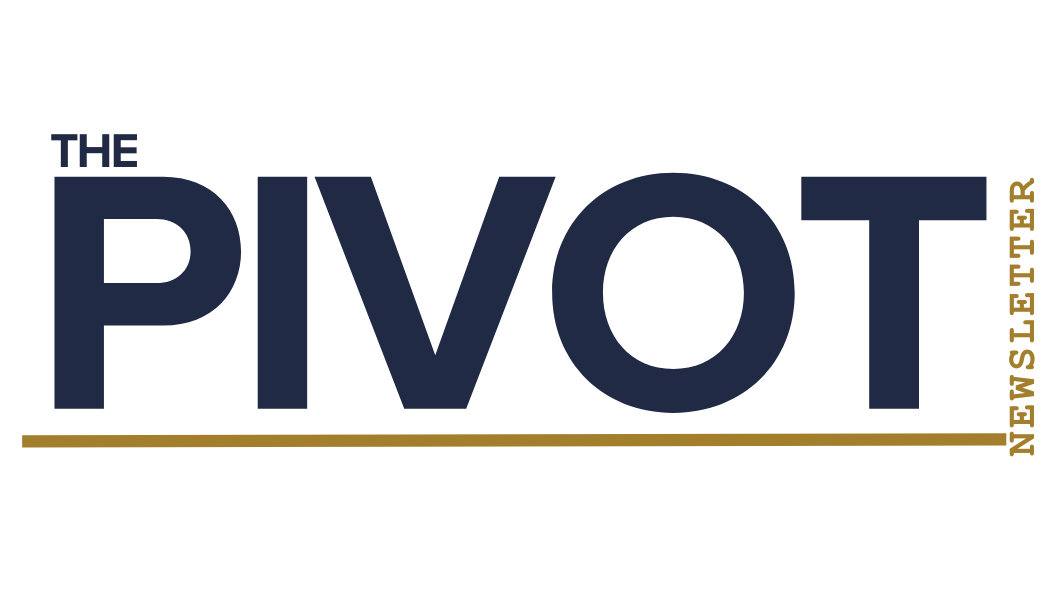
1st Period - Harvest relationships
Relationships are critical to navigate your career. They allow opportunities to come your way and help generate serendipity. Simply put, the best way to build relationships is just to be a good teammate. The qualities associated with good teammates warrant no further explanation for hockey players. There’s good reason hockey guys/girls often find success in professions with heavy relationship management components (i.e. Sales). However, what might be a foreign feeling for hockey players is the proactiveness required to harvest relationships in your post-playing career. It’s easy making friends in hockey. Twenty-ish players are corralled in a locker room together and forced to become buddies. Outside of hockey there’s a slight change in the dynamic. You actually have to work to build working relationships. This was a challenge for me. I’m naturally more reserved and all my friends I either already have, or my wife makes for me. However, I knew I had to initiate professional relationships, especially as a young professional, in order to expedite my success and build optionality in my career. Below are several small tactics to keep in mind when building professional contacts.
- Invest Before You Need Them - Strive to build relationships with people before you ever need them. Forge relationships because you’re genuinely curious to learn, interested in people, and open to helping the other person. Approach relationships with the idea that you don’t want anything from the other person but want to find ways to bring value to them. Build goodwill with people that you can tap into for the future.
- Avoid Transactional Relationships - The opposite of the previous bullet. A transactional relationship is where you are using the other person for the sole purpose of achieving a short-term goal. Often the value proposition is one-sided. Do not pop up out of nowhere asking for a favor from someone and then never heard from again. That’s an easy way to get written off. I’m not saying don’t ask for favors, but understand how to manage the ask. The last thing you want the other person to feel like is they’re being used.
- Reach Out with Confidence - One of the most consistent hurdles I see players run into is they are unwilling to reach out to their contacts. Whether it's ego, embarrassment, or general unease, don't be afraid to reach out. More often than not, people want to help you, especially if you’ve built up goodwill and have a solid reputation. The same rings true for cold introductions. For example, if you come across a contact in the same school alumni network that you’d like to meet, reach out tactfully. Worst case the person doesn’t respond. More often than not, people want to 1) help people and 2) talk about themselves.
- Appreciate People Already Around You - I often fly blind to the people I already know and underappreciate their willingness to help. Take inventory of the direct contacts in your rolodex and the insights they can provide. Whether it’s an introduction to an interesting person or advice on how to crack a particular industry, hockey players typically have a broad swath of contacts.
- Reach Back Out - Relationship quality is more important than quantity. The easiest way to build quality is to consistently connect with the same people. Don’t just kick tires with certain people. If you’re genuinely interested in them, work to build the relationship over time. It definitely takes some intentionality. It can be as easy as a text, DM, or forwarding an article every so often.
- Do Your Homework - Especially for meeting 1) People for the first time and 2) More senior professionals, do your homework. Research their background. Come to the meeting with thoughtful questions and insights. Nothing is a bigger waste of time than showing up to coffee with someone who is busy and asking them, “tell me about your career path”. Never ask someone if you can “pick their brain” either. Be specific.
2nd Period - Dr. Julie Gurner
This thread is loaded with insight. No further writing required.
Natural Talent is a cheat code to extraordinary success...but it's not a given.
— Dr. Julie Gurner (@drgurner) March 15, 2023
Here are 9 things that can sink even the most talented people. 1/
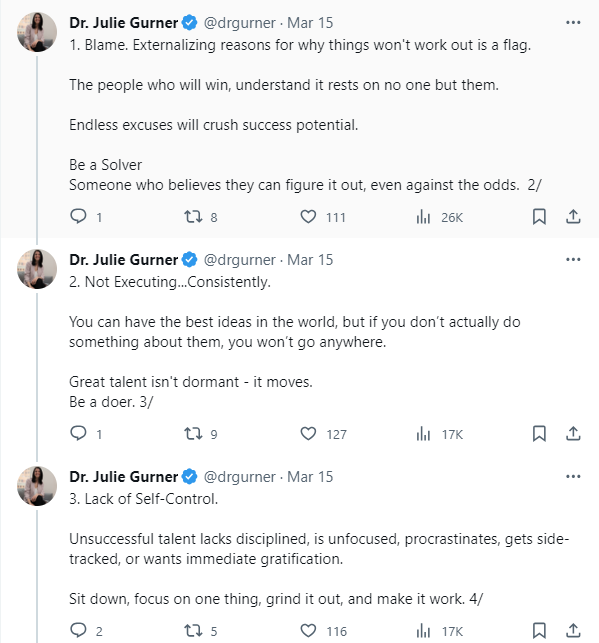
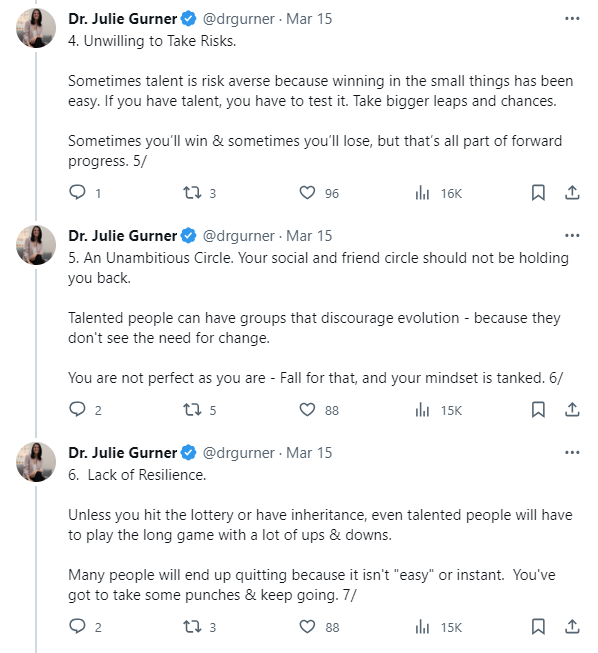
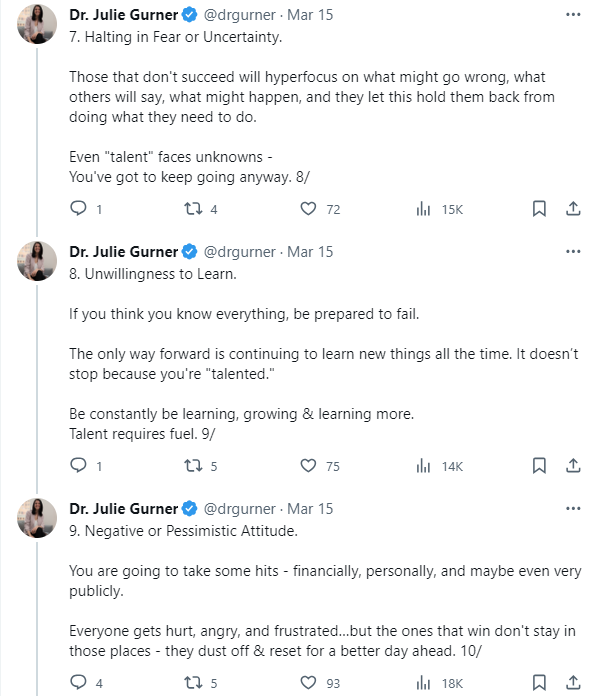
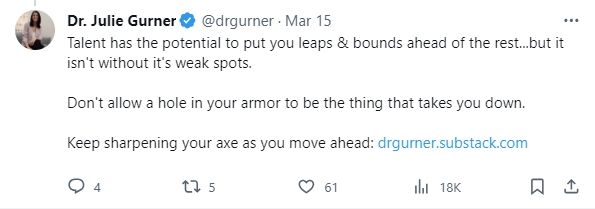
3rd Period - Landing my jobs
Along the way, I plan to share insights from my own pivot into the working world that I think will prove instructive for others. The way in which I’ve gone about getting every position I’ve had in my career should hopefully make the points around relationships in the 1st Period more tangible. On paper, I’ve led very much a traditional path through finance: internships, analyst roles, rise to mid-level, MBA, gain some decision-making responsibility, ultimately become a senior leader of an organization, start hiring your own team, etc. Not readily apparent is that I was an unconventional candidate pursuing a traditional track. A huge part of my success in gaining every subsequent position was my ability to leverage relationships and connections.
Below is a breakdown of every professional position on my resume and the entry contact to the organization.
Internship 1: Hockey alumni from my college
Internship 2: The same hockey alumni from Internship 1 connected me with another hockey person
Job 1: College alumni
Job 2: High school alumni
Job 3: Client of the company from Job 2
I gained each position through a direct or indirect connection. If you’re hoping to get a job by Hail Mary’ing your resume into Indeed or LinkedIn, you’re approaching this the wrong way. Most corporations now use an algorithm to scan resumes for all the qualities they’re looking for. Good luck getting by the algorithm. After the algo screen, HR people thumb through the dwindled down resume pile and select whoever jumps out at them that day. These lucky contestants then join the group of resumes that circumvented all those steps; this group consists of internal candidates, resumes the hiring manager knows personally, and resumes emailed directly to the hiring manager from a trusted source. Again, best of luck to the cold turkey applying candidate who the hiring manager has no affinity towards. Candidates should do everything they can to circumvent all the HR weeding-out of resumes, in order to increase chances of success.
A recent, personal anecdote to all this. I recently hired a new analyst to join the team. We had 100+ candidates, the algorithm cut the pool of resumes in half, and I had to eyeball the rest for compelling hires. The guy we hired didn’t even make it by the algo. For some reason, the algorithm didn’t like his resume and he didn’t get pushed through to the next round. To the candidate’s credit, he leveraged his network, and two separate people emailed me to check-out his resume. It was abundantly clear the candidate’s background was superior to the rest of the prospect pool. The interview process proved that out and we ended up hiring him. Moral of the story, the hiring algo can go rogue and your resume never sees the light of day. If the newly hired analyst didn’t work to get his resume in front of my eyeballs, his life would be a lot different today.
Public job boards and platforms like LinkedIn and Indeed can be helpful. They certainly are a signal of open positions and who’s hiring. If you find a position on those platforms you’re interested in, you need to find an alternative route to that position. Do you know anyone at the company? Do any school alumni work there? Do you have mutual relationships with the hiring manager? Anything to get an edge is helpful.
As I’ve talked about before, it’s much easier to tap into these connections and relationships before an open job even pops up. For example, my first full-time position after college and hockey was ‘Job 1’ (from above list). I targeted this company (we’ll call the company TFL) as a desirable place to work. The Chief Investment Officer at TFL went to the same undergraduate college as me. I drove 45 minutes multiple times to go meet this guy for coffee in the two years previous to accepting the position. I kept top of mind with the shot caller of the firm. When an entry-level position opened, he told me about it, I applied, he forwarded my resume to the direct hiring manager, and the rest is history. I spent two years harvesting the relationship before enjoying the fruits of my labor.
Game Notes
- Boys are struggling - WSJ
- The World Excel Championships - WSJ
- The mechanics of Shohei Ohtani's $700M contract - FanGraphs
- Fascinating company: Anduril - Can it reinvent the U.S Defense Industry? - YouTube
- How being interestesting landed an investment banking job - X
- Tennis on Netflix: Nadal vs. Alcaraz - Front Office Sports
- Maybe one day we can get NHL Network on Netflix (see last week's complaint)
- The Fed took the lid off the market concerns - Yahoo! Finance
- Overhaul coming for iPads - CNBC
Thanks for subscribing. Please comment below with your thoughts. Pass along the newsletter to teammates.
Instagram is up and running. Follow @pivot.hockey

Member discussion